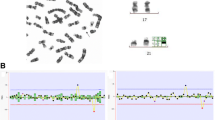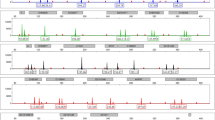Abstract
Multiplex Ligation-dependent Probe Amplification (MLPA) is a method to determine the copy number of up to 60 genomic DNA sequences in a single multiplex PCR based reaction.
MLPA probes consist of two oligonucleotides that can hybridize next to each other on a certain DNA sequence of interest, where they are ligated. All ligated probes are subsequently amplified by PCR using a single set of primers. Each amplified MLPA probe has a unique length and can be visualized and quantified by capillary electrophoresis. As the primers are almost 100% consumed in the PCR reaction, the quantity of each PCR amplicon is proportional to the number of copies of each probe target sequence in the DNA sample. A trisomy 21 can therefore be detected by an approximately 50% increased signal of each chromosome 21 specific probe relative to reference samples.
MLPA with the P095 Aneuploidy probemix for chromosomes 13, 18, 21, X and Y has been used as a rapid detection method on large numbers of samples from uncultured amniotic fluid or from chorionic villi. As compared to FISH and karyotyping, MLPA is more rapid, has a higher throughput, and is less expensive. MLPA however cannot detect low grade mosaicism, female triploidies, and copy number neutral chromosome abnormalities such as inversions and translocations.
Access this chapter
Tax calculation will be finalised at checkout
Purchases are for personal use only
Similar content being viewed by others
References
Schouten JP, McElgunn CJ, Waaijer R et al (2002) Relative quantification of 40 nucleic acid sequences by multiplex ligation-dependent probe amplification. Nucleic Acids Res 30(12):e57
Nygren AO, Ameziane N, Duarte HM et al (2005) Methylation-specific MLPA (MS-MLPA): simultaneous detection of CpG methylation and copy number changes of up to 40 sequences. Nucleic Acids Res 33(14):e128. https://doi.org/10.1093/nar/gni127
Slater HR, Bruno DL, Ren H et al (2003) Rapid, high throughput prenatal detection of aneuploidy using a novel quantitative method (MLPA). J Med Genet 40(12):907–912
Gerdes T, Kirchhoff M, Lind AM et al (2005) Computer-assisted prenatal aneuploidy screening for chromosome 13, 18, 21, X and Y based on multiplex ligation-dependent probe amplification (MLPA). Eur J Hum Genet 13(2):171–175. https://doi.org/10.1038/sj.ejhg.5201307
Hochstenbach R, Meijer J, van de Brug J et al (2005) Rapid detection of chromosomal aneuploidies in uncultured amniocytes by multiplex ligation-dependent probe amplification (MLPA). Prenat Diagn 25(11):1032–1039. https://doi.org/10.1002/pd.1247
Van Opstal D, Boter M, de Jong D et al (2009) Rapid aneuploidy detection with multiplex ligation-dependent probe amplification: a prospective study of 4000 amniotic fluid samples. Eur J Hum Genet 17(1):112–121. https://doi.org/10.1038/ejhg.2008.161
Gerdes T, Kirchhoff M, Lind AM et al (2008) Multiplex ligation-dependent probe amplification (MLPA) in prenatal diagnosis-experience of a large series of rapid testing for aneuploidy of chromosomes 13, 18, 21, X, and Y. Prenat Diagn 28(12):1119–1125. https://doi.org/10.1002/pd.2137
Kooper AJ, Faas BH, Kater-Baats E et al (2008) Multiplex ligation-dependent probe amplification (MLPA) as a stand-alone test for rapid aneuploidy detection in amniotic fluid cells. Prenat Diagn 28(11):1004–1010. https://doi.org/10.1002/pd.2111
Kooper AJ, Faas BH, Feuth T et al (2009) Detection of chromosome aneuploidies in chorionic villus samples by multiplex ligation-dependent probe amplification. J Mol Diagn 11(1):17–24. https://doi.org/10.2353/jmoldx.2009.070140
Boormans EM, Birnie E, Oepkes D et al (2010) Comparison of multiplex ligation-dependent probe amplification and karyotyping in prenatal diagnosis. Obstet Gynecol 115(2 Pt 1):297–303. https://doi.org/10.1097/AOG.0b013e3181cbc652
Author information
Authors and Affiliations
Corresponding author
Editor information
Editors and Affiliations
Rights and permissions
Copyright information
© 2019 Springer Science+Business Media, LLC, part of Springer Nature
About this protocol
Cite this protocol
Schouten, J., van Vught, P., Galjaard, RJ. (2019). Multiplex Ligation-Dependent Probe Amplification (MLPA) for Prenatal Diagnosis of Common Aneuploidies. In: Levy, B. (eds) Prenatal Diagnosis. Methods in Molecular Biology, vol 1885. Humana Press, New York, NY. https://doi.org/10.1007/978-1-4939-8889-1_11
Download citation
DOI: https://doi.org/10.1007/978-1-4939-8889-1_11
Published:
Publisher Name: Humana Press, New York, NY
Print ISBN: 978-1-4939-8887-7
Online ISBN: 978-1-4939-8889-1
eBook Packages: Springer Protocols




